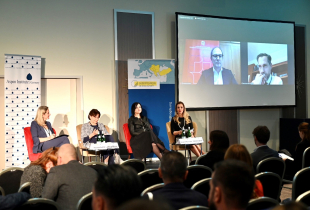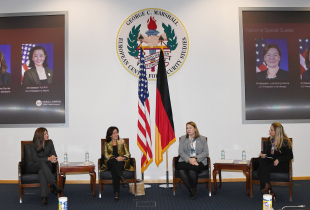
COVID-19 and Southeast Europe
Introduction
2020 was billed as a breakthrough year for Southeast Europe. In the last months of 2019, the United States appointed two special Balkan envoys and the European Union’s incoming leadership emphasized the region as an immediate priority. Since then, the coronavirus pandemic has claimed hundreds of lives and scrambled politics and diplomacy across the region. Euro-Atlantic milestones coexist with fresh involvement by other world powers and mixed trends in internal relations. Minimizing human costs and salvaging hopes for further progress will require far-sighted engagement and attention to first principles by regional leaders and their partners.
A Cruel Spring
As in many places, reports of a new respiratory illness in China at first drew only passing interest in Southeast Europe. As late as February 26, 2020, a televised appearance by Serbian health experts with President Aleksandar Vucic featured light-hearted talk about shopping in Italy and drinking alcohol to avoid infection. Meanwhile, a Croatian man returning from Milan became the region’s first confirmed coronavirus case on February 25, with others in Greece, North Macedonia, and Romania the next day. Neighboring countries followed until Montenegro became Europe’s last state to report an infection on March 17. By the end of April six weeks later, the virus had caused over 31,000 infections and nearly 1,400 deaths across the region. The few million regional nationals working elsewhere in cases, with Europe contracted additional close to 700 more infections and forty-two deaths by early April just among Romanians.1 Gaps in reporting and testing leave the true scale of the virus’s spread likely even larger.
Funding and other medical sector shortfalls have deepened the challenge of coping. On top of the underlying wealth gap, average regional health expenditures of 5% of GDP trail the EU figures of 8% for public and 10% for total (public and private combined) health outlays.2 Numbers of hospital beds and physicians relative to population are accordingly also lower than in other parts of Europe.3
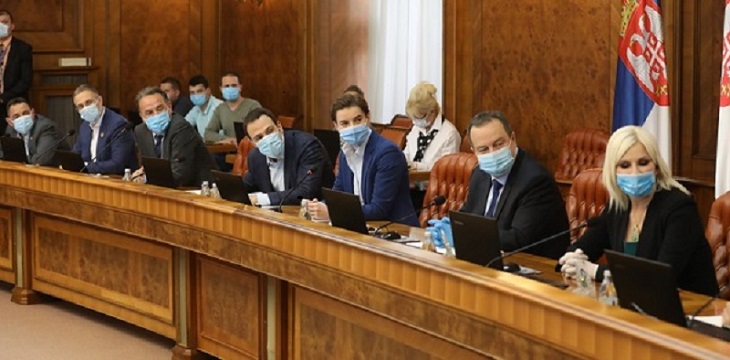
Against those realities, authorities have responded with a varied mix of measures. By the second half of March, countries including Bosnia-Herzegovina, Bulgaria, North Macedonia, Romania, and Serbia declared states of emergency, while Albania extended one adopted after an earthquake the previous November. Bosnia-Herzegovina’s Republika Srpska entity added a ban on false information leading to public panic or disorder. Slovenia canceled leave for medical staff. Schools, universities, and non-essential businesses closed. Officials restricted entry for foreign travelers, required quarantines for returning citizens, and/or imposed curfews and stay-at- home orders for residents that stretched to near-total bans on outside movement for senior citizens in Bosnia-Herzegovina, Romania, and Serbia and a quarantine of Romania’s hard-hit Suceava district. Enforcement measures have included military patrols as well as fines up to €40,000 and jail sentences up to a proposed fifteen years in Albania.4 Greece further restricted movement for the more than 100,000 migrants in refugee camps on its territory while Bosnia- Herzegovina and Serbia did the same for the 15,000 migrants in camps on theirs.
Political and Economic Fallout
The escalating crisis quickly dominated regional politics. Romania’s Health Minister Victor Costache resigned in early April over criticisms of government response and proposed plans to test the entire population of Bucharest. In Bulgaria, counterpart Minister Kiril Ananiev faced pressure over unpaid doctors’ bonuses5 and a presidential veto forced amendment of the government’s emergency declaration.
The pandemic also postponed several elections. The first was early voting for parliament in North Macedonia that had been called for April 12 after EU leaders rejected the start of accession talks the previous fall. This extended the mandate of a cross-spectrum technical government and delayed a closely matched contest between the country’s two biggest parties, the Social Democratic Union and VMRO-Democratic National Unity Party, over the merits of the 2018 Prespa Agreement with Greece as well as investigations into misuse of public office. It also put off challenges to the Democratic Union of Integration’s leading role among ethnic Albanian parties by newer groups such as the Albanian Alliance and the BESA Movement, the latter of which concluded a pre-election pact with the Social Democrats in late February. Meanwhile, the next postponement concerned regular parliamentary elections in Serbia scheduled for April 26. These had promised less drama given the dominant position of President Vucic’s Progressive Party and an announced boycott by the opposition Alliance for Serbia over complaints about media access. Finally, in early April, Romania also pushed back June local elections seen as a test of party strength ahead of November parliamentary ones. In February, proposals to change local election rules had triggered the latest in a series of no-confidence votes against successive short-term governments since 2016.
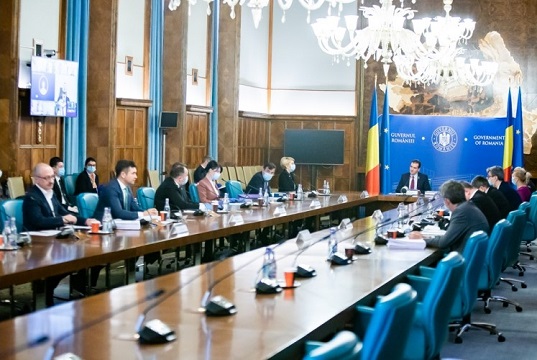
Differences over response to the virus also contributed to constitutional clashes and coalition collapse in Kosovo. The Self-Determination (Vetvendosje) Party and the Democratic League of Kosovo (LDK) had formed a government in February, but political infighting between them over lifting tariffs on goods from Serbia escalated after Prime Minister Albin Kurti of the former fired Interior Minister Agim Veliu of the latter for supporting President Hasim Thaci’s call for a state of emergency on March 16. President Thaci urged citizens to ignore Kurti’s subsequent effort to impose curfews on the government’s own authority. In the meantime, LDK leaders tabled a no- confidence motion that passed parliament on March 25. This temporarily left Kurti as acting Prime Minister while sparking further debate over whether other parties could form a new government or fresh elections would be needed after the pandemic.
The pandemic’s mounting economic toll threatens to compound such turmoil. According to IMF forecasts, Southeast Europe will likely suffer a far more damaging downturn than during the global financial crisis of 2008-2009. Regional economies should contract by 6% this year, with national estimates ranging from a low of 3% in Serbia to highs of 9% in Croatia and 10% in Greece.6 Such a recession (or depression) will cause a collapse of government revenues, increase already high levels of debt, and deepen economic and social inequalities.
Several factors exacerbate the region’s vulnerability. One is high pre-existing unemployment. Unemployment rates in 2019 in Greece and the Western Balkans averaged in the high teens (compared to the EU average of 6.3%), with youth unemployment twice that level. The current crisis will worsen this situation as companies go bankrupt and more people lose their jobs. Another is several countries’ dependence on tourism. Within Greece, which has just recently enjoyed an improving economic mood but now again looks to be among the most negatively affected countries in the Eurozone, the sector accounts for a fifth of GDP and jobs. Croatia and Montenegro are similarly exposed. A third is widespread reliance on remittances as a safety-net that stands to fray with lockdowns and travel restrictions in places such as France, Germany, and Italy. Remittances account for close to 10% of GDP for several countries in the region and as much as 16% in the case of Kosovo and 25% for Montenegro. The World Bank’s estimate of 20% global drops in these flows thus threatens real bite.7 Along with the other emergency measures, regional governments have adopted economic support packages to help their people and businesses get through the crisis. As elsewhere, however, the scale of challenges may exceed national capacities to respond.
International Engagement
Advances in Euro-Atlantic integration amidst the pandemic injected some optimism to the region. First, on March 17 a special remote vote by the Spanish Senate completed the ratification process for North Macedonia’s admission to NATO. North Macedonia officially became a member ten days later with the deposit of accession documents with the U.S. State Department. Meanwhile, on March 25-26, European Union leaders green-lighted the launch of accession talks with Albania and North Macedonia. This arguably overdue decision still came with qualifications: start dates were not set, enlargement processes were revised in line with the French non-paper of the previous fall, and additional conditions were specified for Albania. Still, the move showed that the EU can take strategic decisions even in the middle of a major crisis and avoided further delays that would have diminished the EU’s power of attraction and fueled competing visions for the region’s future. Within that spirit, EU members Bulgaria and Croatia also moved ahead with efforts to join the ERM-2 (Exchange Rate Mechanism-2) Eurozone “waiting room.”
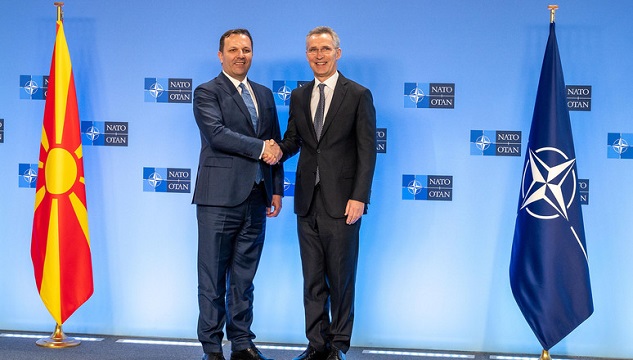
More directly COVID-related, support for public health has been a staple of Euro-Atlantic assistance since the 1990s. EU officials calculate cumulative assistance in this field to Serbia alone at 450 million euros.8 EU Instrument for Pre-Accession (IPA) funds have included projects for eradication of swine flu and rabies in Serbia as well as improved medical screening and air quality in Kosovo. Accession talks with candidate countries have also covered health standards under chapter 28. Meanwhile, the United States Agency for International Development (USAID) has devoted tens of millions of dollars to other projects such as reconstruction of health clinics in Bosnia-Herzegovina and other countries affected by the conflicts of the 1990s. More recent programs have supported care of people with disabilities in Montenegro and efforts to counter medical sector corruption in Albania.
Despite this background, initial Euro-Atlantic reactions to the coronavirus often lacked coordination. During the first week of March, the Czech Republic, France, and Germany imposed tight restrictions on exports of protective medical gear even to other EU members.9 Germany later relaxed its restrictions, but on March 14 the European Commission required national government permits for such goods’ export outside the EU.10 Two days earlier European Commission President Ursula von der Leyen and European Council President Charles Michel had condemned President Trump’s move to ban non-citizen travel to the U.S. from Europe “unilaterally and without consultation,”11 only to see individual EU states similarly close their borders to one another in the following weeks. G-7 heads of state and government endorsed more joint action in a video conference call March 16, but disagreement over the term “Wuhan virus” reportedly blocked a follow-up statement by the countries’ foreign ministers nine days later.12
Gradually, however, Euro-Atlantic partners extended more mutual support. Within Southeast Europe, EU members Bulgaria, Croatia, Greece, Romania, and Slovenia are eligible for a range of programs including €7.5 billion collective national shares of reprogrammed EU funds for medical needs and employment support under the Coronavirus Response Investment Initiative announced by the European Commission March 1313 as well as additional shares of the €2.7 billion Emergency Support Instrument approved on April 14. On March 30, the Commission also announced a more than €410 million assistance package for the Western Balkans. €38 million will provide immediate aid to the region’s health systems for purchase of medical equipment, protective gear, and other needs. The rest of the package, a total of €374 million, will help address longer-term challenges of economic crisis and recovery.14 On a more modest scale, the same day the United States earmarked $5.5 million from USAID’s Global Health Emergency Reserve Fund for Western Balkan countries for laboratory systems, response equipment, and public communication.15
NATO and its members delivered additional emergency assistance. In one prominent example, on April 8 Turkish military cargo flights brought protective gear and testing supplies to Bosnia- Herzegovina, Montenegro, and North Macedonia in response to those countries’ requests to NATO’s Euro-Atlantic Disaster Response Coordination Center; Turkey flew additional assistance to Kosovo and Serbia.16 During this timeframe, Norway also airlifted a field hospital and further supplies to North Macedonia17 and the Netherlands delivered supplies to Montenegro. In Kosovo, KFOR’s Civil-Military Team donated supplies to hospitals in Pristina and Gracanica and U.S. National Guard troops serving with the mission trucked protective gear to local authorities in both sides of Mitrovica.18 Bulgaria and Romania received planeloads of protective gear via C-17 aircraft of the Strategic Airlift Capability consortium based in Hungary.
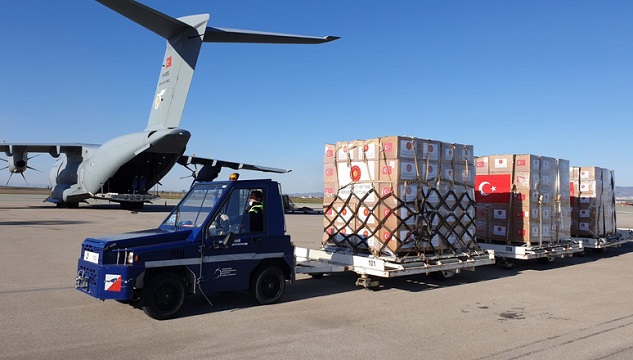
Southeast European states have also served as assistance providers, including through NATO and EU frameworks. In late March and April, Albania sent two teams consisting of ninety doctors and nurses to Italy as a gesture of gratitude for decades-long past support from that country. Romania sent a smaller team of seventeen medical personnel to Italy in April as well. In other cases, states within the region have provided crisis-related help to one another. For example, Croatia, Serbia, and Slovenia each donated aid to Bosnia-Herzegovina.
Nonetheless, the halting early Euro-Atlantic reaction raised demand for assistance from additional sources. This prominently included China, which has steadily increased its economic and political visibility in the region through the 17+1 trade and investment platform as well as the Belt and Road Initiative for infrastructure projects. All countries in Southeast Europe except Kosovo participate in both. China has also promoted its soft power through cultural exchanges, media presence, and Confucius Institutes.
Building on such ties, on March 21, China sent the first planeloads of external medical aid to Greece and Serbia as part of its “masks diplomacy” response to COVID-19. In Greece, a large sign on a supply pallet referenced Aristotle’s definition of friendship as “one soul residing in two bodies.” In Serbia, similar inscriptions praised the two states’ “steel friendship.” President Vucic personally welcomed the shipment and six accompanying Chinese experts, having contrasted the support from “Chinese brothers” with the “fairy tale” of European solidarity days before.19 Billboards with the message “Thanks Brother Xi” reinforced these themes. China sent more supplies to countries such as Croatia and Slovenia in April.
Russia, which has also recently raised its profile in the region, followed in early April by sending nearly a dozen planes with larger shipments of protective gear, pharmaceuticals, and ventilators to Serbia and the Republika Srpska entity in Bosnia-Herzegovina. Accompanying military medical teams fanned out with local counterparts to disinfect areas and set up treatment centers in several locations in both places.20
Southeast Europe’s receipt of supplies from China and Russia is neither unique nor inherently nefarious. The United States purchased crisis-related goods from both during this period, with wide media coverage of a Russian Antonov cargo plane’s landing in New York April 1. Other European countries, especially Italy, took deliveries as aid. Still, several states including Germany found test kits and other items from China to be of unusable quality and Italy’s La Stampa newspaper reported that little Russian aid matched actual needs. Moreover, analysis by the EU’s External Action Service links the deliveries to disinformation campaigns aimed at shifting attention from China’s role in the outbreak and reducing the credibility of the West’s handling of the crisis.21
Regional Relations
The coronavirus has also affected intra-regional dynamics. By their nature, the cascade of border closures in March most disrupted ties among neighboring states. On April 9, Western Balkan foreign ministers sent a joint letter to top EU officials calling for exemption (later granted) from restrictions on purchase of protective medical gear from the Union as a signal that “in this we are all together as Europeans.”22 Croatia, which was also hit by a destructive earthquake March 22, was forced to cancel many meetings of its six-month EU Presidency and to convert the centerpiece EU-Western Balkans summit in Zagreb in May to a lower key online format.
Efforts to broker a normalization agreement between Kosovo and Serbia have also been affected. EU-sponsored negotiations had recently stalled as a result of 100% tariffs imposed by Kosovo on products from Serbia and Bosnia-Herzegovina and Serbia’s campaign to reverse international recognitions of Kosovo, though U.S. special envoy Richard Grenell secured deals for restoring air and rail links in the first weeks of the year. In late February, Kosovo’s Prime Minister Kurti announced plans for temporary suspension of tariffs beginning with those on raw materials, but pressure from Grenell and other international partners to go further served as background for the coalition’s breakup after the differences over an emergency declaration described above. Amidst wider speculation about the factors involved, Kurti charged Grenell with acting as the “international motor” behind his government’s ouster in hopes of securing a quicker deal with Serbia.23 While the EU appointed Slovak diplomat Miroslav Lajcak its own special envoy April 3, preoccupation with the pandemic, Kosovo’s unsettled politics, and Serbia’s pending elections all complicate further talks in the short run.
Looking Ahead
Southeast Europe, as well as the wider Euro-Atlantic community and world, is still in the early stages of the COVID-19 pandemic. The dramatic developments of March through April represent just the start of a longer-term challenge that may bring or accelerate transformative change. As the region and its partners move beyond immediate crisis reaction, focus should be directed to collaborative steps that maximize opportunity for comprehensive recovery. The following basic points will help.
First, the need for rapid, sometimes drastic measures to control the virus should not negate commitment to democratic principles. Leaders must not misuse or unduly extend sweeping emergency powers in ways that eliminate checks and balances. First, the need for rapid, sometimes drastic measures to control the virus should not negate commitment to democratic principles. Leaders must not misuse or unduly extend sweeping emergency powers in ways that eliminate checks and balances (including by media and civil society), aggravate political tensions, and fuel renewed regional instability. The same applies to controls on potentially promising disease contact-tracing technologies. Similarly, regulatory waivers and fast-track procedures should not undo transparency and widen space for corruption. Medical procurement is especially vulnerable in this regard. Particularly now, diversion of resources from patients and health professionals to unscrupulous private interests would bring disastrous consequences.
Second, reaffirmation of Euro-Atlantic integration and cohesion will reinforce the preceding observations. While the coronavirus pandemic has reopened debates over national self-reliance and global interdependence, the types of “modest multilateralism” embodied by NATO and the EU may prove even more essential through the crisis’s next phases.24 The states of Southeast Europe can also prove themselves as active, equal partners through complementary regional cooperation through frameworks such as the Three Seas Initiative that can facilitate redevelopment of production and transportation networks.
Finally, COVID-19 provides another reminder of the importance of strengthened strategic communication. Governments as well as EU and NATO bodies must present publics with clear, reliable, resonant information concerning key health issues and policy responses. Broader understanding of both will counter further spread of the coronavirus as well as related disinformation.
For Academic Citation
Matthew Rhodes and Valbona Zeneli, “COVID-19 and Southeast Europe,” Marshall Center Security Insight, no. 58 (May 2020): https://www.marshallcenter.org
/en/publications/security-insights/covid-19-and-southeast-europe-0.
Notes
1 Carmen Paun, “Romania Shuns its Diaspora in Coronavirus Fight,” Politico Europe, April 10, 2020.
2 As of 2018: Albania 3%, BiH 6.3%, Bulgaria 5%, Croatia 7%, Greece 5%, Kosovo 2.5%, Montenegro 6.8, North Macedonia 6% Romania 4.7%, Serbia 5.1%, Slovenia 8.1%; Eurostat, “Statistics Explained,” https://ec.europa.eu/eurostat/statistics-explained/index.php?title=File%3APublic_expenditure_on_health_relative_to_GDP%2C_2008_and_2018_(%25)_CPC20.png.
3 Eurostat, “Statistics Explained,” https://ec.europa.eu/eurostat/statistics-explained/index.php?title=File%3ATotal_general_government_expenditure_on_health%2C_2018%2C_%25_of_GDP.png.
4 Gjergi Erabara, “Albania’s Planned Jail Terms for Curfew Breakers Spark Protests,” Balkan Insight, April 10, 2020.
5 Svetoslav Todorov, “Bulgaria Health Minister under Fire for Handling of Pandemic,” Balkan Insight, April 3, 2020.
6 Madalin Necsutu, “Balkan Economies Expected to Contract in Pandemic, IMF Warns,” Balkan Insight, https://balkaninsight.com/2020/04/15/balkan-economies-expected-to-contract-in-pandemic-imf-warns/.
7 Dilip K. Ratha, Supriyo De, Eung Ju Kim, Sonia Plaza, Ganesh Kumar Seshan, and Nadege Desiree Yameogo, “COVID-19 Through a Migration Lens,” World Bank Group Migration and Development Brief; no. 32, accessed on April 10, 2020, https://openknowledge.worldbank.org/bitstream/handle/10986/33634/COVID-19-Crisis-Through-a-Migration-%20Lens.pdf?sequence=1&isAllowed=y.
8 “EU Announces COVID-19 Help for Balkans, Eastern Neighbours,” Euractiv, March 30, 2020.
9 Amie Tsang, “E.U. Seeks Solidarity as Nations Restrict Medical Exports,” New York Times, March 7, 2020.
10 “Export of Medical Equipment not Banned by EU, Member States Decide on Authorisation,” European Western Balkans, March 17, 2020.
11 “Joint Statement by President von der Leyen and President Michel on the U.S. Travel Ban,” March 12, 2020.
12 Christoph Schult, “G-7 Drops Joint Statement Following Dispute over Language,” Der Spiegel (International), March 26, 2020.
13 Director General Gert Jan Koopman, “Coronavirus Response Investment Initiative,” European Commission Technical Briefing, March 13, 2020. For a discussion of national debate on this funding, see Ivailo Kalfin, “Is Bulgaria Getting EU Help to Fight Coronavirus?” Euractiv, March 25, 2020.
14 European Commission, “EU Response to the Coronavirus Pandemic in the Western Balkans,” Fact sheet, April 2020.
15 U.S. Department of State, “The United States is Leading the Humanitarian and Health Assistance Response to the COVID-19 Crisis,” Fact Sheet, March 30, 2020.
16 Hamdi Firat Buyuk, “With Balkan Aid Flights, Turkey Projects Great Power Image,” Balkan Insight, April 10, 2020.
17 “NATO’s Response to the COVID-19 Pandemic,” NATO Fact Sheet, April 14, 2020.
18 “NATO Helps Kosovo and Montenegro During COVID-19 Pandemic,” European Western Balkans, April 29, 2020.
19 Julija Simic, “Serbia Turns to China due to ‘Lack of EU Solidarity’ on Coronavirus,” Euractiv, March 18, 2020.
20 Paul Goble, “Moscow Using Pandemic to Shore Up Alliance With Serbia Against NATO and China,” Jamestown Eurasia Daily Monitor, April 14, 2020.
21 European External Action Service, “Short Assessment of Narratives and Disinformation around the COVID- 19/Coronavirus Pandemic,” EEAS Special Report Update, April 24, 2020. See also Simon van Dorpe et al. “China Put Pressure on EU to Soften Coronavirus Disinformation Report,” Politico Europe, April 25, 2020.
22 Hans von der Burchard and Andrew Gray, “Western Balkan States Call for Exemption from EU Medical Export Restrictions,” Politico Europe, April 9, 2020.
23 Amy MacKinnon, “In the Balkans, if You Neglect History, It will Backfire,” (interview), Foreign Policy, April 23, 2020.
24 Hal Brands, “The Case for Modest Multilateralism,” Bloomberg, April 22, 2020.
About the Authors
Dr. Matthew Rhodes is Chair of the Area Studies Department and a professor of national security studies at the Marshall Center.
Dr. Valbona Zeneli is Chair of the Strategic Initiatives Department and a professor of national security studies at the Marshall Center.
The Marshall Center Security Insights
The George C. Marshall European Center for Security Studies in Garmisch-Partenkirchen, Germany, a German-American partnership, is committed to creating and enhancing worldwide networks to address global and regional security challenges. The Marshall Center offers fifteen resident programs designed to promote peaceful, whole of government approaches to address today’s most pressing security challenges. Since its creation in 1992, the Marshall Center’s alumni network has grown to include over 14,000 professionals from 156 countries. More information on the Marshall Center can be found online at www.marshallcenter.org.
The articles in the Security Insights series reflect the views of the authors and are not necessarily the official policy of the United States, Germany, or any other governments.
